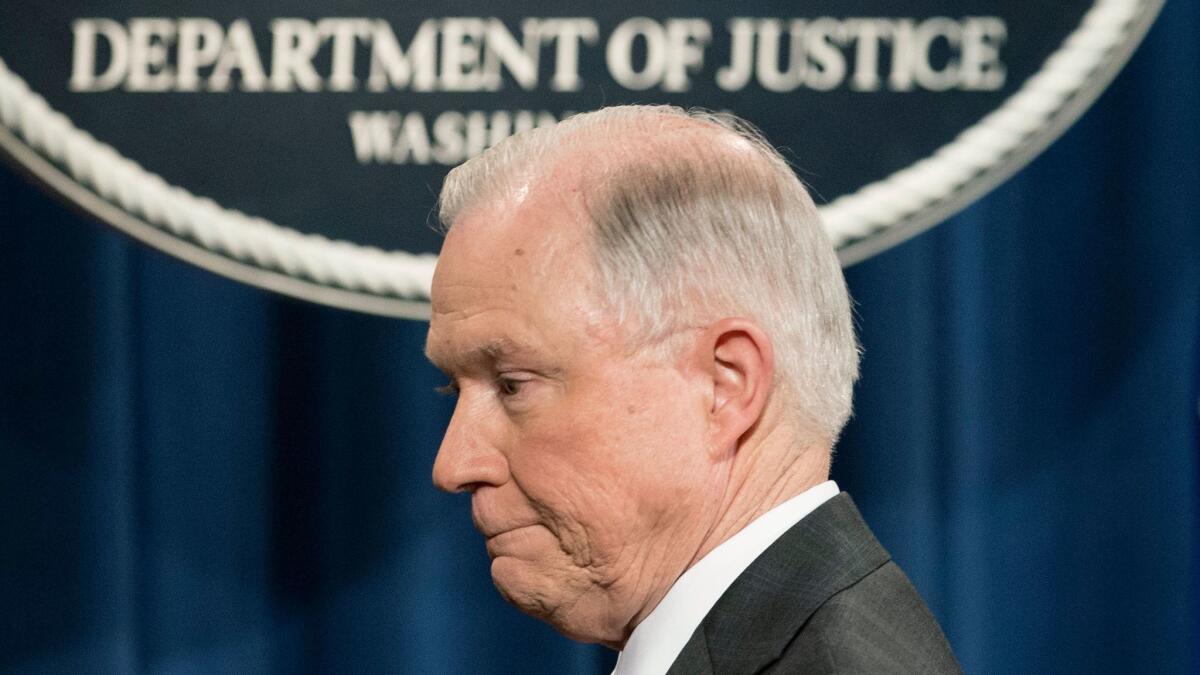The Trump administration’s Russia problem won’t go away

- Share via
Good morning. I’m Paul Thornton, The Times’ letters editor, and it is Saturday, March 4, 2017. For readers in and around Los Angeles, the long-awaited open streets event Golden Streets will close major thoroughfares in the San Gabriel Valley to vehicle traffic tomorrow, allowing only pedestrians and cyclists. Here’s a look back at the week in Opinion.
Where have we heard this before: A top-level official in
Ex-national security advisor Michael Flynn lost his job last month in the nascent administration for lying to Vice President Mike Pence about his discussions with Russian envoy Sergey Kislyak about the Obama White House’s sanctions against Moscow in retaliation for the Kremlin’s interference in the U.S. presidential campaign. Now, after testifying otherwise in his Senate confirmation hearing, Atty. Gen.
Michael McGough, The Times’ senior editorial writer, warns that Democrats are not content merely to pick off Cabinet members with all the information emerging about Trump and Russia:
The Washington Post report about Sessions’ meetings with the Russian ambassador came the same day the New York Times reported that in the final days of the Obama administration, officials “scrambled to spread information about Russian efforts to undermine the presidential election — and about possible contacts between associates of President-elect Donald J. Trump and Russians — across the government.” The salvage operation was partly motivated, the story said, “by the suspicion among many in the Obama White House that the Trump campaign might have colluded with Russia on election email hacks — a suspicion that American officials say has not been confirmed.”
This is the Holy Grail — or smoking gun, to switch clichés — of some Democrats’ imaginings. Trump has been criticized for mocking concerns about Russian interference in last year’s election as an attempt by Democrats to delegitimize his presidency. But let’s face it. If it were established that his campaign colluded with efforts by Russian intelligence to hack into Democratic email accounts and feed the contents to WikiLeaks for dissemination, that would delegitimize his victory big-league — and it might implicate campaign aides who were involved in criminal conduct. Watergate comparisons would be in order.
Of course, as the New York Times conceded in its most recent story, such collusion “has not been confirmed.”
That story is also interesting for the way it expands on a claim in a Feb. 14 story that “members of Donald J. Trump’s 2016 presidential campaign and other Trump associates had repeated contacts with senior Russian intelligence officials in the year before the election.” Wednesday’s story explained: “The label ‘intelligence official’ is not always cleanly applied in Russia, where ex-spies, oligarchs and government officials often report back to the intelligence services and elsewhere in the Kremlin.” Hmm.
There is a case to be made for investigating Russian meddling in the election that has nothing to do with casting doubt on the legitimacy of Trump’s election.
But clearly some Democrats hope it can be shown that the Trump campaign had guilty knowledge of, and maybe even abetted, attempts by Russian intelligence to hack Democratic email accounts and use WikiLeaks to pollute the campaign with the contents. Such a revelation would mean more than a few indictments. It could trigger resignation or impeachment of a man many Democrats consider “not my president.”
But suppose that, after a thoroughly credible investigation, the proof just isn’t there. Will Democrats regret having invested so much emotional energy and political capital in a single conspiracy theory?
Better late than never, Atty. Gen. Sessions. Last month, before the Trump administration’s Russia saga embroiled him, The Times Editorial Board called on Sessions to recuse himself from any
Take it from a Jewish American: Steve Bannon is not a racist or anti-Semite. Jeffrey Scott Shapiro, who once worked at the formerly Bannon-run Breitbart and has known the controversial Trump advisor for six years, assures readers that he never heard his former boss utter any racist or anti-Semitic statements. “The accusations of racism and anti-Semitism leveled against my former editor are unjust, weapons in a battle against a legitimate point of view about the direction of the nation,” Shapiro says. “They are meant to chill free speech, and as such their real target is the Constitution of the United States.” L.A. Times
Trump's proposed database of crimes by immigrants is shameless propaganda. Studies show that immigrants are less likely than others to commit crimes, but the president falsely believes otherwise and wants to produce evidence that non-native Americans are more dangerous than everyone else. “President Trump declared Tuesday night that ‘we must support the victims of crime,’ which sounds like a sensible and humane notion,” says The Times. “But Trump didn’t have all crime victims in mind, just a certain type.” L.A. Times
More immigrant-friendly cities should be as brave as Santa Ana. The New York Times’ Lawrence Downes admonishes civic leaders who have expressed reservations about the “sanctuary” label (cough,
Hey, California Democrats, you can resist Trump better by showing the nation you know how to run a state. Opinion contributing writer Conor Friedersdorf points out that only Democrats can be held responsible for any major political failures in California, much like Republicans must be held accountable at the federal level now that they control Congress and the White House. Worse, he writes, failure by California Democrats to govern effectively is “high-octane fuel” for the Trump coalition. L.A. Times
There’s an election on Tuesday, which means we have endorsements. Citizens of Los Angeles will go the polls on March 7 to vote on the mayor, their
Reach me: paul.thornton@latimes.com
Sign up for Essential California
The most important California stories and recommendations in your inbox every morning.
You may occasionally receive promotional content from the Los Angeles Times.








